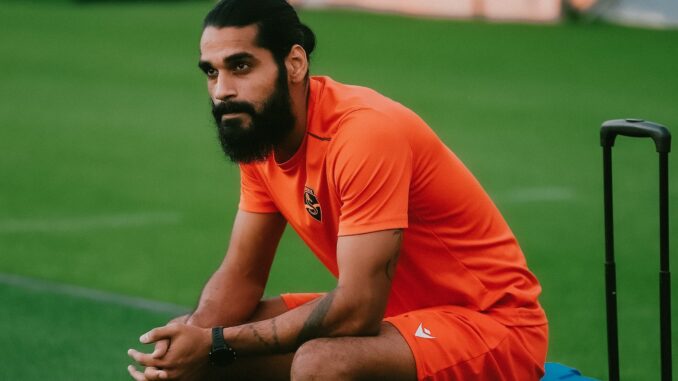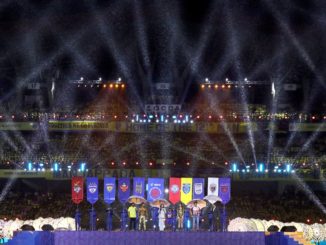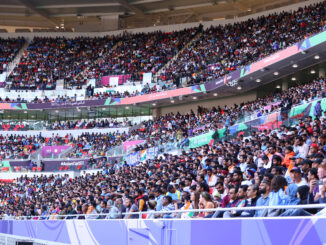
So eager was Sandesh Jhingan to hit the ground running when he landed in Šibenik, a picturesque Croatian city on the shores of the Adriatic Sea, that despite the burning jet lag from a torturous 40-hour journey that involved four flights and a four-hour car ride, within hours of arriving he decided to go for a run.
Jhingan, a towering central defender, had just secured a move from Indian Super League side ATK Mohun Bagan to HNK Šibenik in 1.HNL, the top division of the Croatian football system.
The 28-year-old’s move to Croatia had generated a huge amount of interest back in his homeland, where very few players have ever made the move to Europe.
So on a typically sun-drenched day on the Croatian coast, Jhingan followed his normal routine after travel and went for a run.
And that’s when the trouble began.
While on that run, soaking up the sunshine, Jhingan injured his calf. No less than four hours after arriving in Šibenik, things had already taken a turn for the worst.
“I made a mistake on my own,” Jhingan admitted candidly to The Asian Game.
“I landed after 36 hours of flying and I should have rested but I went for a jog because I wanted to get the lactic acid out, so then I (could have) a cold shower so (that) I will be successful the next day when I was supposed to start training with the team.
“Then after that injury it could have been managed better, I believe. (There were) mistakes from my side and a lot of people got involved in that injury. I was so motivated, and also I feel I got a little bit impatient as well, because I felt I was in a peak of my fitness and then to get injured at that moment … I just felt that I need to come back fast and I rushed to get fit quickly.
He added: “A lot of people (got) involved with it, a lot of physios got involved or doctors got involved, a lot of opinions come out of it and a lot of opinions are not good for injuries.
“I couldn’t put together five or six days of training without pain. I would train for four or five days and again my calf would give up and again I will do a rehab in the gym quickly instead of just patiently resting.”
It reached a point where Jhingan knew he had to return home to India to be treated by his former physio, someone he knew and, more importantly, someone he trusted.
“I decided to come back to India for treatment because there’s one physiotherapist, Gigy George who I’ve known for 10 years,” he explained.
“So if four or five physios couldn’t fix me there, I felt I needed to come back to India to be with someone who’s known my body for the past ten years. When I came to him, boom, (we) started to find out the real root cause of why I’m having this issue.”
Having endured a torrid few months, his return to India was made a permanent one when he re-joined ATK Mohun Bagan in January; a move that surprised and shocked, with his European dream ending without even setting foot on the pitch.
The reasons for his return, Jhingan explained, are complex and multifaceted.
“When I came back to India we had, (I) can’t speak in detail, but we had a change of owners and I think the financial strain on the club was a lot,” he said.
“I think they openly admitted that on their own, so when the new owners came in they had new plans, they had to cut down the budget and a lot of things which I really didn’t want to get into.
“I could have stayed as well if I wanted to but I’m not a person (to stay) if I’m not welcome. I understand they were financially struggling, so I didn’t find a concrete reason that I should stay there because the club is struggling financially, they want to offload you so why would you want to be somewhere you’re not welcome?”
Having had a taste of playing in Europe, the 28-year-old still holds ambitions of playing abroad again, but says Indian players shouldn’t define success and their careers by whether they made it to Europe or not.
“I don’t want people (in) my country to only believe only if you go to Europe can you be considered as a great player,” he said.
“I don’t want people to have that, if Sandesh Jhingan or any other junior kid, if he wants to validate or prove himself that ‘I’m going to be a legend’, that he can only do it only if he plays for a bigger club in Europe. This is I don’t believe is the right way of looking at it.
“If it’s your dream, go for it. If not, it’s not a bad thing to play for your country. To play in the ISL is not a joke, it’s a lot of effort and sacrifices to play at this level.”
Over the past 18 months that sacrifice has arguably been greater than at any time of their careers, with the Indian Super League operating in strict bio-secure bubbles that has seen players, coaches and staff spend an inordinate amount of time away from family, friends and vital support networks.
The mental and physical toll it takes can only be felt by those who experience it, according to Indian football legend Sunil Chhetri.
India’s highest goal scorer and most capped player recently tweeted: “Only if you’re in the bubble, will you know how hard and frustrating this is. You’re away from family for half a year, cooped up in a room, anything outdoors is a luxury, there’s no change in setting to help you shake off a bad result – I could go on.
“To get through this is not something you can train for. It has nothing to do with skill, talent or experience. This is up there on the list of sacrifices we’re making, to be able to play the game we love. It’s a battle we’re all fighting in our ways.
“Reach out when you need to share, lend an ear to someone who needs to speak. We’re all going through the same thing and I just thought it would be nice if we could pick each other up when we need to.
“To any ISL player, across clubs, nationalities and experience – I’m up for a chat if you need one. We don’t have to talk football. Drop me a message if you feel like it, and we’ll make it happen. The season, table, wins and losses will take care of themselves when they have to.”
Aside from his stint in Croatia, Jhingan said his memories of the past two years are entirely spent in bubbles.
“What Sunil did, that’s why is the captain of our national team,” he explained. “He always sets an example and leads by it.
“Firstly, you’re missing your family. You’re missing your parents, you’re missing your partner, and everything which in a normal lifestyle, you have all those small, small, beautiful things you don’t appreciate. But the moment you’re out of it, you tend to appreciate them a lot. So you’re really away from it.
“If I (had to) say how challenging it is, it’s hard to describe in words. If you’ve not been in a bubble, you won’t understand it. If you’re in lockdown at home it is different. You’ve got family there, you’ve got everything, (and) even that is difficult, but staying in a room five, six or seven months with just your thoughts alone, it can be quite challenging.”
Surging COVID cases in India over the past six weeks have played havoc with the current ISL season, with almost all teams suffering outbreaks and matches regularly having to be postponed as a result.
“Being in a bubble, the thing is, of course it exhausts you mentally, but we all understand that it is what is needed because safety is the most important thing. So we’ve got to stick by the rules and that is how it is and everyone is suffering.
“(But) being in the bubble for long can upset you mentally. You know, I think sometimes people tend to forget that the players also are human beings. We also have parents back home, we also have our partners, our brothers, sisters who worry for us, because most of the year, we are not at home.
“So our parents back home, they’re worried for us.”
Photo: HNK Šibenik
Listen to Episode 78 of The Asian Game podcast as we go In Conversation With… Sandesh Jhingan




